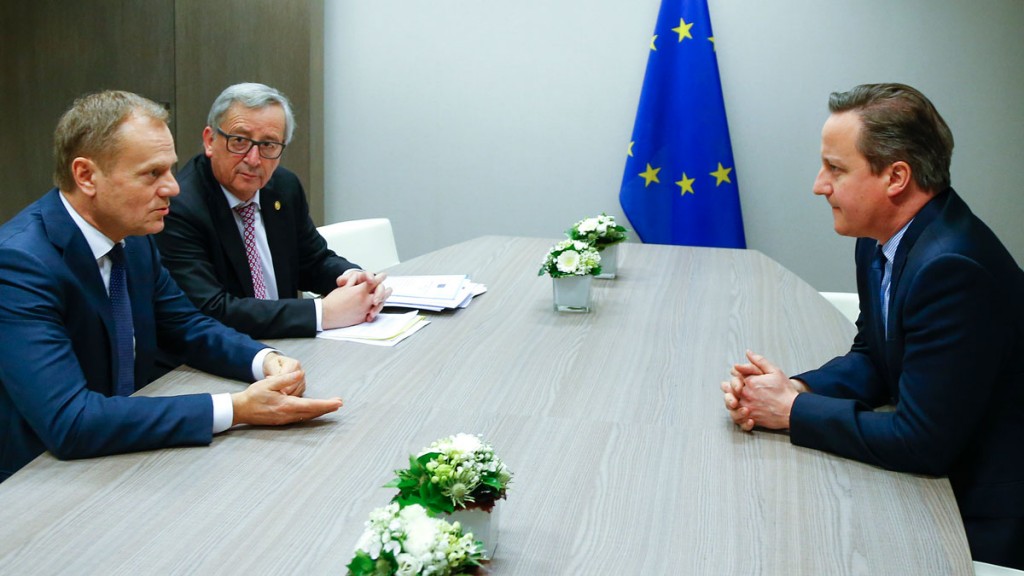
The EU referendum will be a big talking point this year. But what are the facts? In the second of a series of briefings, Simon Wilson looks at the potential effect on trade outside the EU.
What’s the issue?
Much of the debate on Brexit and trade focuses on whether Britain’s trade with the rest of the European Union would be hit by the UK choosing to leave (discussed here last week). But what about trade with the rest of the world? Even without the UK, the EU would remain the world’s second-biggest exporter behind China, and its second-biggest importer after America. So it has serious clout when it comes to negotiating trade deals. The UK, despite being the world’s fifth-biggest economy, would clearly have less bargaining power on its own.
On the other hand, Brexit would mean Britain could look to negotiate trade deals specifically tailored to the interests of its own businesses and consumers, rather than get bogged down in compromises to meet the needs of 27 partners. The question, then, is: would the benefits of being a smaller, nimbler trade partner with autonomy outweigh the likely costs incurred due to reduced negotiating power?
What’s the answer?
Much depends on the deals we can negotiate. According to Dr Gregor Irwin, former chief economist at the Foreign Office, in a long report on Brexit for advisory firm Global Counsel, the UK’s trade policy priorities are in reality unlikely to be much different from the EU’s, but leaving would give it less leverage and make it a lower priority trade partner than the EU for other major economies. He argues that size matters more than ever, given that trade negotiations are increasingly bilateral or regional, rather than multilateral.
Moreover, the EU is currently a signatory to more than 30 bilateral and regional trade agreements with 50 partners, and is currently negotiating deals with America, Canada and Japan, improving access for member states to markets worth $23trn. If it left the bloc, the UK would have to renegotiate all of that, at the same time as it tries to use its new-found freedom to negotiate new deals of its own.
Sounds like a tall order?
Indeed, especially given the mood music coming out of Washington, Beijing and elsewhere. The US government (America is Britain’s second-biggest trade partner after the EU) has long made clear that it is anti-Brexit, and in October the US trade representative, Michael Froman, dismissed the idea that it would be quick to sign any kind of bilateral deal. According to the pro-Brexit economist Roger Bootle, this was a “scaremongering tactic designed to influence UK public opinion”.
Even so, there’s no guarantee of a trade deal, even with our closest ally, and any deal with Washington would involve tough compromises (especially on pharmaceuticals and other intellectual property). Equally, when it comes to the prize of boosted trade with China and India, the leaders of both countries have made crystal clear that they want to see the UK remain a part of the EU. All of which raises obvious worries about the UK’s prospects as a go-it-alone free trader.
What’s the other view?
The Global Counsel’s view represents the cautious, pro-status-quo consensus. But there are equally respected voices, such as that of Capital Economics, which last week published a lengthy analysis of Brexit commissioned by Neil Woodford’s fund-management business. It argues that even if Britain’s overall trade with Europe took a knock from Brexit, it is “quite easy to imagine those losses being offset over the long term by the opportunities, created by leaving the EU, to boost trade with other countries”.
The thrust of this more optimistic argument is that (a) recent growth in UK exports has come largely from countries and regions outside the EU; and (b) the rest of the world is likely to grow much faster than the EU in the coming years. “Brexit would therefore give Britain a crucial opportunity by allowing it to broker its own trade deals with non-EU countries.”
But would the rest of the world be interested?
Absolutely. Some opponents of Brexit suggest that big economies would not want to bother negotiating trade deals with the UK, given that it accounts for just 2.5% of global GDP. But the UK remains a significant economy and so-called “clout” is only one factor: being smaller, we can act faster. According to Capital Economics, Switzerland (not an EU member and much smaller than Britain) has been more successful at concluding free-trade deals than the EU, for example, with Japan.
Moreover, Britain – if free to pursue a unilateral trade policy – would be able to cut tariffs on imports to below EU levels, helping it secure access to overseas markets while also boosting consumers’ real (after-inflation) incomes and spurring domestic competition. In turn, this would boost competitiveness in export-driven sectors, such as manufacturing, helping the UK become a more balanced economy.
These things take time
It’s obviously hard to predict how Brexit would play out, says Professor Christopher Grey on TheConversation.com, given that the scale of multiple simultaneous renegotiations of global free-trade agreements (FTAs) would be unprecedented.
What we can say for sure is that the process would not be quick. The EU-Singapore FTA took seven years to negotiate, the one with South Korea took four, and the one with Canada five. The UK might be able to get deals sorted out more rapidly on its own, but it’ll still take time. Small and nimble Switzerland, for example, has succeeded in negotiating an FTA with China – but it, too, took five years to hammer out.
Investment Briefing series: What would Brexit mean for Britain?
• discussed here last week